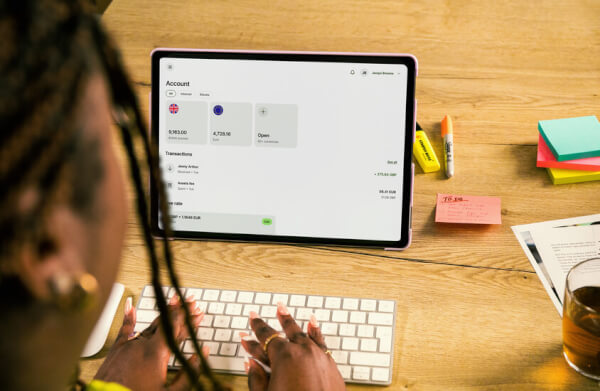Managing Remote Working like a Pro
Remote working has never been more popular. Driven by necessity during the recent pandemic, the trend for flexible, home and hybrid working now looks like...

Freelance work is more popular than ever. Quality high-speed Internet has made it easier to do all kinds of work from your computer, and the modern, global economy prizes skilled independent contractors that can turn around a project quickly. Since they aren’t bound to a specific office, many freelancers use their careers to scratch their wanderlust and live abroad.
But where to settle? With a mix of healthy, modern economy and openness to foreign workers, Germany is one of your best bets. The cost of living in Germany is relatively more affordable than in other Western European hotspots like the UK, France, and Scandinavia. Berlin, a metropolis of three million people, is more affordable than London or Paris but has a reputation for being one of the most exciting, artsy, dynamic capitals of Europe. Germany is also the largest economy in Europe and home to many multinational companies.
This article provides some essential tips and tricks for starting your freelancing career in Germany, navigating the bureaucracy and revenue service, and assembling the skills you need for success.
Yes! The German government encourages freelance work and while bureaucracy and paperwork can give you a headache in any country, they've structured their regulatory system to make it relatively easy to get on your feet. With the proper visa, you’re legally allowed to do freelance work while you live in Germany.
So you’re doing contract work for an organization. You’re not their employee, but does that make you self-employed, or a freelancer? The difference can be confusing. If you’re self-employed, that means that you technically own your own business. But it’s only freelance work if you do it on behalf of another company or organization, not, for example, an independent plumber working for private homeowners. That’s why freelancers are able to conduct their business under their own name, rather than a brand name. Self-employed people often work under an official business name.
Put simply: all freelancers are self-employed, but not all self-employed people are freelancers.There are even different legal classifications in Germany between being a freelancer (Freiberufler)Selbstständiger)
Why does this matter? If you’re self-employed, you have to register your business or trade with your local government, and may need to acquire health or regulatory permits. Freelancers and self-employed persons also have different tax obligations.
| Create your resume by choosing the best resume format from our free resume templates and customize it with your history. |
|---|
Germany has a relatively relaxed visa policy that encourages foreign workers to set up shop. Most countries require you to be employed or have an employment offer from a native company to obtain a worker visa. Not so in Germany.
The government allows any EU citizens (plus those from Iceland, Liechtenstein, Norway, and Switzerland) to legally enter, live and work in Germany for up to 90 days. You merely need a valid passport to enter.
If are a US, Canadian, or Australian citizen, you can apply for a freelance visa after you’ve arrived in country and that would allow you to stay long-term. It’s a good idea to apply for your visa as soon as you arrive in Germany, as the approval process can take 3-4 months.
Before you do anything else, go to the Burgeramt and register as a resident. After you have done that, you go to a local Ausländerbehörde (“foreigner’s office”) and provide the following information. When you have done that, you can fill out an application.
For each appointment you have with the Ausländerbehörde, you have to pay a fee, which can run from €50-120 ($59-141). Prepare for multiple appointments.
As a skilled expat worker, you'll likely get paid through a wire service. There are many options, such as Western Union or Paypal. But you’ll want to be aware of the fees and exchange rates charged by different financial institutions. Most banks and transfer services charge low up-front fees but take advantage of you by using a higher exchange rate and skimming the difference.
To receive payment and have the largest amount left over when you collect it, give Wise a try. That way, your money will be converted with the real exchange rate - the same one you’ll find on Google - and that should put more money back in your pocket.
The Wise multi-currency Borderless account may also be well suited to your needs. A borderless account allows you to have “local bank” status in either the EU, UK, US, or Australia but reside in a different country and send, manage, or receive money through the account in dozens of currencies, including euros.
Freelancers are the darlings of the modern economy and global companies are eager to hire them, so there are many websites that allow organizations and independent contractors to find each other. Two of the most popular freelance sites are Upwork and SimplyHired. While it’s not based in Germany, it does allow you to apply for jobs from all over the world. The only thing that matters are your qualifications.
With around 270,000 active users and 70,000 active projects, Twago is the largest marketplace for European freelancers. The website has portals for each European country and keeps a small share of the income you make from each job.
Other useful freelance sites are Gulp, Jomondo, https://www.freelance.de, and Freelancer Map. Nothing prevents you from creating and maintaining a profile on every one of these sites. The more exposure you get, the more jobs you can land.
Germany has a multi-payer insurance system that's distinct both from Western European counterparts like France and the UK, which have a single-payer system and from the US, which has a private market except for the poor and elderly. All working people pay about 15% of their income to a “statutory” insurance plan provided through their employer. As your income rises, you pay a greater share into the common fund. Those who make over €52.200 ($61,200) a year are required to purchase a private insurance plan. The unemployed and homeless are covered by the state. Since 2009, all residents of Germany are legally required to have health insurance, whether through the public system or a private plan.
So where do you, the expat freelancer, fit in? You have several options. You can pay into statutory insurance, which costs a minimum of around €300 ($352) a month but covers spouses and children. If you’re a younger, healthier freelancer, private insurance will probably be cheaper for you at around €100-150 ($117.25-175.88) per month.
You also may qualify for a private health insurance plan from your home country, or an international health insurance plan. International plans can be barebones (not covering dental or regular checkups, for example) but will protect you if you get sick.
One additional option is Künstlersozialkasse (KSK), a social fund designed specifically for freelancers in artistic or creative fields. If you can convince the KSK that your income is derived from one of the fields they cover, then it's a better deal than any other insurance option available.
Unlike other self-employed workers, freelancers aren’t required to pay a trade tax. Nor are they obligated to pay into the German social security or governmental healthcare systems, or unemployment and pension insurance. This greatly eases your tax burden.
You’re merely responsible for filing an income tax return for the calendar year, paid out in quarterly instalments to the German tax office. Germany has a progressive tax system, so your income determines your tax bracket.
When you settle in the country, you must obtain a tax ID from the government and secure a tax accountant. You may be required to complete additional filings and be subject to specific reporting requirements. To be certain you satisfy taxation regulations, it’s wise to keep a careful record your invoices and expenses and consult your accountant for advice on how to remain tax compliant back home and in your new country.
It’s important to research the possible deductions you can claim to reduce your overall tax burden. Freelancers who do content, marketing, development and IT work can often claim office, travel, and meal expenses. Before you file your taxes, discuss your possible expenses with a savvy accountant and see how much you can save.
One of the most appealing parts of freelance work is the ability to work at home. You don’t have a commute, you’re not tied to a strict workday, there’s no boss interrupting you at your cubicle, you can work in sweats, and you don’t have to your co-workers smelly sandwich during lunchtime. But many freelancers find spending both their working time and leisure time at home can grow to be stifling and a little maddening.
As more and more people work remotely, “coworking spaces” have risen in popularity. They effectively replicate the office environment (albeit often with a more chic decor) by filling a large space with desks, long tables, Wi-Fi, and coffee and tea services. Freelancers pay a flat monthly rate for access to the space and find the option of getting out of the house and working a few hours a week amongst others worth the expense. Freelancing can be a lonely, competitive hustle, so the social and networking opportunities of coworking spaces are invaluable. You’ll likely share industries with many of the people you share a coworking space with, so it should be your goal to buddy up with them to discuss common clients, productivity methods, job-hunting ideas, and maybe even grab some drinks to vent about your frustrations.
To find coworking spaces near you, check out www.coworker.com/germany or coworking.de.
Research the sites cited above and create a user profile for each of them. Make sure to use an up-to-date photo and list as many marketable skills as you can reasonably claim. Be as specific as you can with your skills. For example, don’t just say you can write in Microsoft Word if you're experienced (or, even better, certified) in advanced documentation software like InDesign or Madcap Flare. Don’t just say you're a good photographer, but instead say you're a master at Adobe Photoshop and Illustrator. It’s important that you not just list what you can do, but also demonstrate a knowledge and expertise at the popular tools in your field.
Try to also supplement your core skills so you can compete for more gigs. For example, if you're a writer, burnish your editing or transcription skills. If you’re a photographer, try and learn some video editing.
While sites like Upwork and SimplyHired are invaluable resources, you may consider creating your own website. Sites like Squarespace or Wix offer numerous simple, useful templates for establishing your online presence for a competitive price. Having a URL that uses your own name and includes writing samples and contact info can send a strong signal that you’re a professional with experience who is ready to work.
Before you start competing for gigs, it’s important to determine your rate. you're competing with other freelancers in your skills space, so you if you overcharge you won’t get work. But if you undervalue yourself, you could be costing yourself thousands of dollars in the course of a year. Spend some time researching the market value of your skills set and determine a solid hourly rate for your efforts.
You need to stay agile and anticipate how you can grow your skill set in the future. The more you can do this, the jobs you can land.
This may seem obvious, but reliability is a crucial freelancer’s skill. That means responding to messages quickly, communicating in a professional manner, being open to feedback, and most importantly, turning work in on time. When you take on work, you must meet your deadlines. You can always gain more skills, but if you don’t turn in assignments on time and sink your reputation, it won’t matter.
A world of opportunity and flexibility awaits a freelancer who can market his or her skills, complete work reliably and on time, and continue to seek out new clients. Whether you choose to live in funky modern Berlin or the vineyards of the picturesque Mosel valley, you can build a splendid German life for yourself. As a stable, world-class economy with many companies hungry to hire contractors, there will be demand for freelance work for years to come. The German government grasps that and has tailored their visa, healthcare, and taxation system accordingly. Find your place!
*Please see terms of use and product availability for your region or visit Wise fees and pricing for the most up to date pricing and fee information.
This publication is provided for general information purposes and does not constitute legal, tax or other professional advice from Wise Payments Limited or its subsidiaries and its affiliates, and it is not intended as a substitute for obtaining advice from a financial advisor or any other professional.
We make no representations, warranties or guarantees, whether expressed or implied, that the content in the publication is accurate, complete or up to date.

Remote working has never been more popular. Driven by necessity during the recent pandemic, the trend for flexible, home and hybrid working now looks like...

Getting paid by international clients as a freelancer can be tricky. Check out our guide to learn the best ways to get paid from abroad without losing on fees.

Essential advice for freelancers in Singapore, covering taxation and best practices for managing your finances effectively.

Freelancing and want to know which freelancer platform to choose - read our review of Upwork to help you decide.

There are three ways to withdraw money from Fiverr; the first two methods are provided by Payoneer, while Paypal provides the third method.

work from home jobs. customer service, writer, editing and proofreading, software engineering, web design, product design.